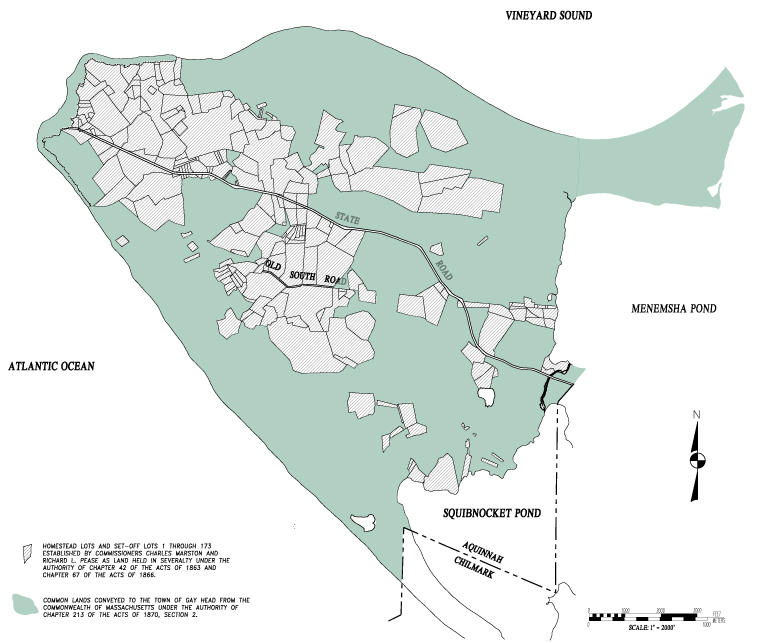GAY HEAD (AQUINNAH) BAND OF THE WAMPANOAG INDIANS
The Gay Head (Aquinnah) Wampanoag Tribe is one of two federally recognized Native American Tribes in the Commonwealth of Massachusetts. Aquinnah is the native name of the area where the Tribe is located and the federally recognized name of the Tribe is the Wampanoag Tribe of Gay Head (Aquinnah). The Indian district of Gay Head was incorporated as a town on April 30, 1870 by Chapter 213 of the Acts of 1870. The town of Gay Head, located on the island of Martha’s Vineyard, changed its name to Aquinnah in 1997. Background information on the common lands and history of the Aquinnah Wampanoag Tribe follow.
Map of Aquinnah by Henry L. Whiting, 1850. See the history and full production of Whiting’s map of Martha’s Vineyard.

Report of the Commissioners to partition the Common Lands under a decree of the Dukes County Probate Court as recorded at the Dukes County Registry of Deeds in Book 65, Page 150 and the grant of deeds to Lots 174 thru 190; Lots 191 thru 510; and Lots 511 thru 736.
Massachusetts Land Court decision from Chief Justice William J. Randall which stated that the remaining landlocked lots in Aquinnah were entitled to easements by necessity. Black et al. v. Cape Cod Company, et al., MA Land Court, Misc. Case No. 69813, Decision dated July 14, 1975. In his decision, Chief Justice Randall stated that there was a “crying need for a thorough and comprehensive planning of access to the entire area.”
Evidence for Proposed Finding against Federal Acknowledgment of the Wampanoag Tribal Council of Gay Head, Inc., Bureau of Indian Affairs, U.S. Department of the Interior, June 25, 1985 (at page 74 it was stated that “Since the division of the lands in the 1870’s, the Indians have more fully accepted the white concept of land ownership, but even today they are much more tolerant of trespass and believe in the right of access for everyone.” At pages 74-75, it was stated that “While common land could be claimed, some was still shared in common. The right of access to all lands was an unwritten right. When the common lands in 1870 were divided in severalty, the rights of access were still assumed. In the division, many of the parcels were land-locked. Without right of access, the division would have been unworkable.”
Land Court decision from Chief Justice Robert V. Cauchon granting access to vacant land near the Gay Head cliffs that required passage over registered land. Taylor et al. v. Vanderhoop et al., MA Land Court, Misc. Case No. 129925, Decision dated July 19, 1989. Justice Cauchon stated that “the law implies from the resulting situation of the parties that [the lots created from the common lands had] a way of necessity over the granted portion of the premises.” The record in Taylor included an affidavit from attorney Philip J. Norton, Jr. of Edgartown, who provided a background of how the Land Court had adopted policies during the registration of land title to preserve “rights of way legally existing” for abutting and nearby parcels. These policies originated with Chief Justice Charles Thornton Davis who served the Land Court between 1909 and 1937.
Maria A. Kitras et al. v. Town of Aquinnah et al., 474 Mass. 132 (2016) and condensed oral argument before the Supreme Judicial Court
The SJC’s decision in Kitras is hostile to the easement by necessity doctrine. Harvard Law Professor Joseph William Singer blog on the decision. Singer is a renowned Indian law expert and an executive editor of Cohen’s Handbook of Federal Indian Law, (Nell Jessup Newton ed., 2012.), the definitive treatise on Indian law.
Background information on the 25 year history of the Kitras case
